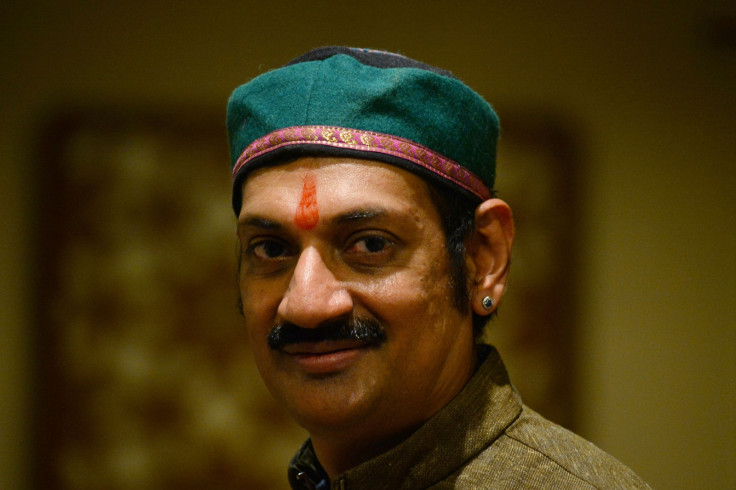India's only gay prince is opening his palace up to vulnerable LGBT people

KEY POINTS
- Manvendra Singh Gohil is turning his palace into a centre for the LGBT community.
- He came out in 2006 but was disowned by his family.
Prince Manvendra Singh Gohil has broken stereotypes, traditions and taboos throughout his life. He is the only member of the Indian royal family to come out as gay, divorced a princess and launched a charity to help LGBT people. However, his latest plan might be the most audacious yet.
Defying his parents, who disowned him after he came out publicly over a decade ago, Singh has opened his 15-acre palace grounds to LGBT people and their allies in a country where sexual activity between people of the same gender is illegal.
The centre will be run in conjunction with the Lakshya Trust, the charity for LGBT people Prince Manvendra founded shortly after he came out in 2006. Named Hanumanteshwar 1927 after the year the four-bedroom palace was built by his ancestor, Prince Manvendra is building more structures to accommodate more potential guests.
Recounting the media scandal caused by him revealing his sexuality, Prince Manvendra, 52, told IBTimes.co.uk he believes he sent positive shockwaves through society that have changed it for the better. For instance, last year India's Supreme Court issued an historic ruling confirming the rights of LGBT people to express their sexuality without discrimination. For a decade, he has devoted his life to helping LGBT people who are less privileged that he is.
"If I could undergo these problems then any other gay person could face a similar situation," he said.
"In India we have a family system and we are mentally conditioned to be with our parents. The moment you try to come out you are told you'll be thrown out and society will boycott you. You become a social outcast. A lot of people are financially dependent on their parents."
"I want to give people social and financial empowerment, so eventually people who want to come out won't be affected. They will have their own social security system. It won't make a difference if they are disinherited."
Growing up in a conservative royal household as the heir apparent to the throne of Rajpipla in Gujarat state and confused about his sexuality, Prince Manvendra's journey into adulthood was uniquely challenging.
"Around the age of 12 or 13, when I was undergoing sexual maturity, I thought I'm attracted to the same sex and not opposite," he recalled.
"I knew there was something different about me, but I didn't know why I was feeling different to others. There was a conflict in myself that was different but at the time I didn't realise I was gay."
As is common with aristocracy, Prince Manvendra's family took an at-arms-length approach to parenting, and he had resolved to squash down his feelings about his sexuality when he chose to marry Chandrika Kumari, princess of Jhabua state in Madhya Pradesh. They divorced after a year in 1992. Hoping to find a "cure" for his sexuality, Prince Manvendra claimed his parents approached medical practitioners to find a "fix".

"Unfortunately for them the doctors were sensitised to these issues and tried to explain they were wasting their time," he said.
"People lack knowledge," he added. "Even educated people like my parents, who are both university graduates, weren't educated on homosexuality".
Gohil laments the lack of understanding about India's history of homosexual and gender non-binary people. Currently, two people live at his LGBT centre: the manager, who identifies as a gay man, and a trans women from the US. Prince Manvendra says that, despite misconceptions, being trans is safer in India than in some parts of America.
In Indian scripture, hijra, kinner, or third gender people, were regarded as demi-gods and played an important advisory role in royal palaces in centuries past, while the Quran also acknowledges that God created ambiguities in gender. Current attitudes towards homosexuality and gender non-conforming and non-binary people are a hangover from British Imperial rule.
"If you read our history and culture homosexuality has been in the Kama Sutra, and we have temples which openly depict homoerotic statues and sculptures," he added.
That is why Prince Manvendra demands that Section 377 of the Indian penal code, which dates back to 1861 and outlaws sexual activities that do not result in procreation, be scrapped immediately with full effect.
Prince Manvendra points out that this is harmful to both heterosexuals and homosexuals, as it prevents people from accessing care for HIV, Aids and other sexual health conditions.
"It has no logic," he said. "We have had independence for 70 years and the UK has done away with it and we are continuing with it. When I give lectures at universities I ask people whether they masturbate and they say yes. So I reply well, then this whole classroom is full of criminals."
Highly aware of his profile and the novelty of being a gay prince, Prince Manvendra plans to take his fight for LGBT rights worldwide.
"Gay rights are human rights. We won't win this fight if I corner myself to a national level. This has to be global." In his quest he has already met presidents, ministers, and governors.
"My mission is to go global and go wherever I'm invited, mainstreaming the cause."
His motivation, he says, comes from the the Sanskrit saying vasudhaiv kutumbakam: or "the whole world is one family".







